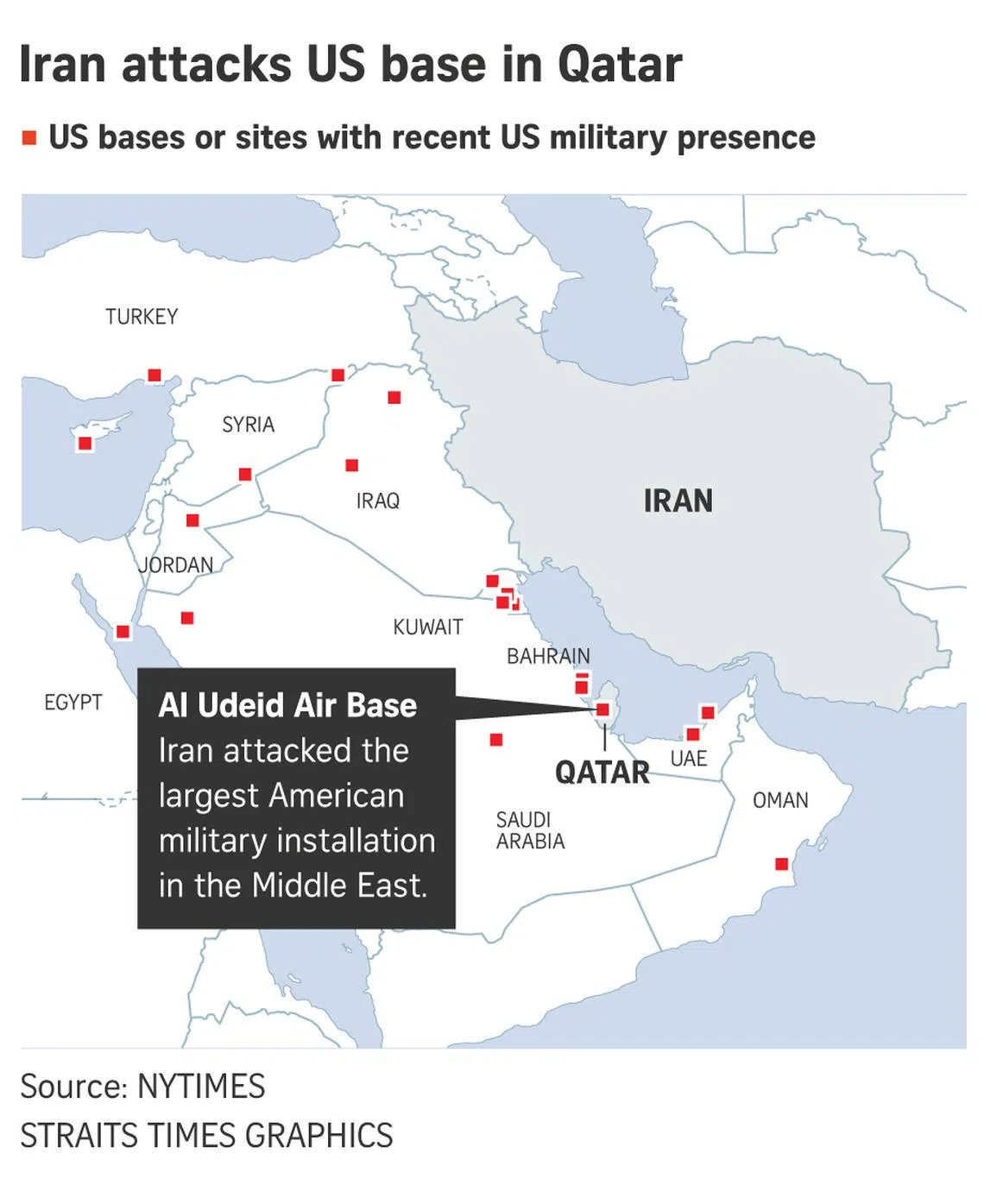Explosions ring out in Tehran despite Trump’s order to Israel to stop strikes
Sign up now: Get ST's newsletters delivered to your inbox
WASHINGTON/DOHA/ISTANBUL – Explosions rang out in Tehran on June 24 despite US President Donald Trump saying Israel had called off air strikes at his command to preserve an hours-old ceasefire.
Two witnesses reached by telephone in the Iranian capital said they heard two loud explosions.
Prime Minister Benjamin Netanyahu’s office acknowledged that Israel struck a radar site near Tehran in what it said was retaliation for Iranian missiles fired 3½ hours after the ceasefire was due to begin.
It said Israel decided to refrain from further attacks following a call between Mr Netanyahu and Mr Trump, but did not explicitly say whether the strike on the radar site took place before or after they spoke.
Mr Trump, en route to a Nato summit in the Netherlands, said Israel had called off its attack, after he rebuked Israel with an obscenity in an extraordinary outburst at an ally whose military campaign he joined two days earlier.
“All planes will turn around and head home while doing a friendly ‘plane wave’ to Iran. Nobody will be hurt, the ceasefire is in effect!” Mr Trump said in a post on Truth Social.
That followed a post in which he said: “Israel. Do not drop those bombs. If you do it, it is a major violation.
“Bring your pilots home, now!”
Before departing the White House, Mr Trump told reporters he was unhappy with both sides for violating the ceasefire, but particularly unhappy with Israel, which he said had “unloaded” shortly after agreeing to the deal.
“I have got to get Israel to calm down now,” Mr Trump said. Iran and Israel had been fighting “so long and so hard that they don’t know what the (expletive) they are doing.”
Israeli media reported that Mr Trump had spoken to Mr Netanyahu on the phone.
A reporter for Axios said Mr Netanyahu told Mr Trump that Israel would scale back the bombing mission rather than cancel it.
Israeli Defence Minister Israel Katz said earlier on June 24 that he ordered the military to strike Tehran in response to what he said were missiles fired by Iran in a “blatant violation” of the ceasefire.
Iran denied launching any missiles, and said Israel’s attacks continued for an hour and a half after the ceasefire was meant to start.
Relief
Despite the initial violations, there was in both countries a palpable sense of relief that a path out of war had been charted, 12 days after Israel launched it with a surprise attack
“We are happy, very happy. Who mediated or how it happened doesn’t matter.
“The war is over. It never should have started in the first place,” Mr Reza Sharifi, 38, told Reuters by phone while heading back to Tehran from Rasht on the Caspian Sea where he had relocated with his family to escape strikes on the capital.
Tel Aviv software engineer Arik Daimant said: “Regrettably, it is a bit too late for me and my family because our house here was totally destroyed in the bombings last Sunday.
“But as they say, ‘better late than never’, and I hope this ceasefire is a new beginning.”
Mr Trump had announced the ceasefire with a post on Truth Social: “THE CEASEFIRE IS NOW IN EFFECT. PLEASE DO NOT VIOLATE IT!”

Israel launched a surprise attack on Iran on June 13, hitting Iranian nuclear sites and killing the top echelon of its military command in the worst threat faced by the Islamic Republic since the war with Iraq in the 1980s.
During the campaign, Israel said it was prepared to topple Iran’s clerical rulers if necessary to achieve its aims.
Iran said its nuclear programme was for peaceful purposes and denied trying to develop nuclear weapons.
Iranian officials said hundreds of people have been killed in Israeli air strikes.
Full information about the extent of the damage cannot be confirmed independently, with media tightly controlled.
Retaliatory missile strikes killed 28 people in Israel, the first time large numbers of Iranian missiles have penetrated its defences.
REUTERS


